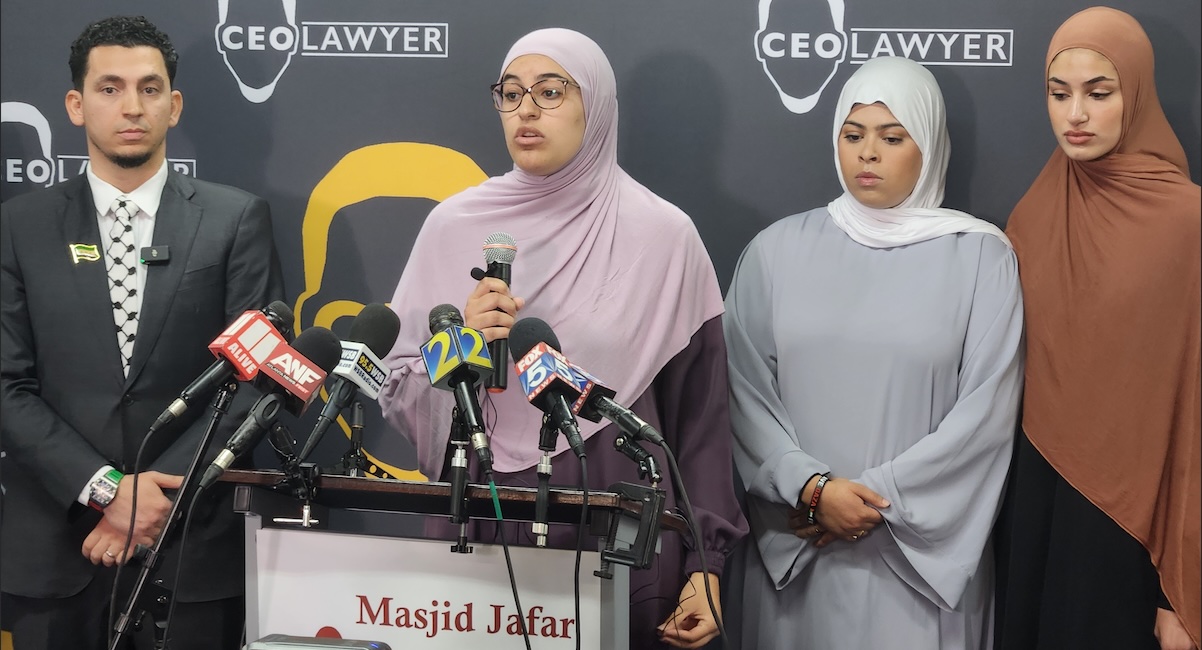In the video a middle-aged Caucasian man leans toward the passenger window of his Tesla Cybertruck, unleashing a string of Islamophobic slurs. His target? A group of three young women in the parking garage of an upscale shopping mall in Atlanta, Georgia.
The response from Atlanta’s broader Muslim community to the incident, which quickly went viral, offers a compelling roadmap for how to respond to hate.
“The community must stand up when there is any injustice,” says attorney Ali Awad of CEO Lawyer Firm, who represented the three women against Perry Greene, ex-husband of Georgia Representative Marjorie Taylor Greene and the man heard spewing hateful rhetoric in the video.
Since the attack, in which Greene is heard yelling, “Go back to your country,” “You are worshipping a false God,” and “Don’t come here from your poor countries,” he has since issued a public apology, attended a sermon at a local mosque and has agreed to pay $75,000 in compensation for the harm he caused.
“This is a case of first impression,” notes Awad, a legal term for cases that have no previous legal precedent in a given jurisdiction. “There is no case law that will tell you what a case like this is even worth. But I believe it’s important for the public to know that there is a punishment for hate speech.”
On March 30, the three women, identified by their first names as Nesrine, Amna and Amira, were preparing to pray in a quiet area of the parking lot at the Avalon Mall in Alpharetta, an affluent suburb of Atlanta. That is when Greene pulled up and began verbally harassing the women from inside his vehicle.
“We decided to take out our phones and record him, hoping he would stop harassing. But he didn’t,” Nesrine told reporters during a press conference following the announcement of a legal settlement between the women and Greene. “We were scared for our lives… Even though we are all American citizens, born and raised here in the United States, that didn’t matter to him.”
Nazia Khanzada with the Council on American Islamic Relations (CAIR)-Georgia described the emotional impact of the assault on the women and on Georgia’s wider Muslim community.
“One of the moms (of the women) said to me, when this happened, her daughter thought those were going to be her last moments, that they were recording the last moment of their lives,” she said, adding, “Every time we stop to pray, we will be thinking, ‘Is someone going to attack us?’ Every time we are out in public wearing Muslim dress, are we going to become targets?”
According to Khanzada, staff at CAIR-Georgia were alerted within minutes of the video being uploaded to the social media site Instagram and quickly reached out to the three women. She said while they knew the identity of the attacker early on, they chose not to make him the focus.
“We knew it was the ex-husband of Representative Marjorie Taylor Green. But we did not want all the attention to be on him. He is a big figure,” she said. “Of course, we were hoping that he would come forward.”
Instead, working with the three women, CAIR issued a public statement demanding a full investigation by law enforcement. The statement initially fell on deaf ears.
“All speech is protected — even the speech we may not agree with,” came the response from the Alpharetta Police. “We have determined no crime was committed… our investigation is closed, and no criminal charges will be made.”
Disappointed but undeterred, that is when the women contacted Awad. Shortly after, word came from Greene.
“Mr. Green requested to meet with the family. Within 24 hours, we facilitated a meeting for him to issue a private apology first, followed by sitting in on the Friday sermon (at the mosque), and then a public apology to the world,” explained Awad.
Less than one week following the incident, on April 4, Green issued a public apology to the three women at Masjid Jafar, a mosque in Johns Creeks, Georgia. More than 100 community members were in attendance.
“I humbly apologize,” said Greene, “because nobody should be treated that way, and that’s not the way to treat anyone with differences. Hopefully they find it in their hearts to forgive me and we shouldn’t allow that in our society.”
Greene followed with individual letters of apology to each of the three women, Awad added. One week later, on April 14, the women announced they had agreed to a settlement for damages totaling $75,000.
“We have evidence of three whole minutes of hateful rhetoric, that was the benchmark that we used,” said Awad. “And we decided that since the minimum insurance is $25,000 in the state of Georgia, that for every minute of hate speech that Mr. Green exemplified, the fee would be $75,000 total for three minutes.”
This is the first case to calculate the damage of hate incidents of this kind in Georgia. While the state adopted hate crime legislation in 2020 it has yet to be successfully tried in a criminal case. Robert Long, the perpetrator of the 2021 Atlanta Spa Shooting, has been charged under the law but has yet to be convicted.
For Khanzada, the incident offers important lessons for how to respond to hate.
“The first thing is report to law enforcement, especially when it’s something very serious like physical violence or things like that involved,” she said. “The second step is to contact an attorney or someone who can give you legal advice. And the third thing is reach out to the community and tell them what happened to you, especially if it can keep other people safe.”
The three women, meanwhile, have decided to donate the settlement money to their local mosque. “I want to tell Mr. Greene that we accept his apology, and we hope he will continue to treat others with fairness, respect, equality and dignity,” said Nesrine in a statement.
She added, “I want to be clear that we do not care about money or media attention. We care about safety, security, and equality. We wanted to help to make sure that this type of incident does not occur again, which is why we all agreed to donate the entire settlement to our local mosque, Masjid Jafar, to combat Islamophobia.”





